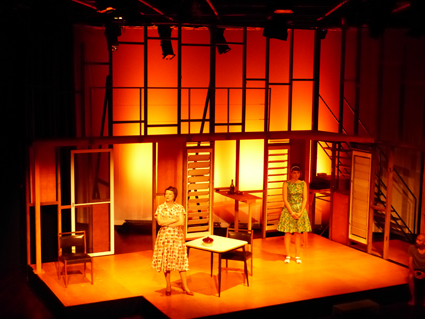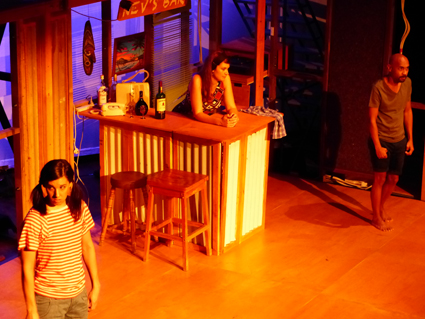 |
Bastard Territory photo Kerrin Schallmeiner |
The play opens with Russell (Benhur Helwend) addressing the audience directly—introducing and watching his memories come to life—and then becoming part of the action. As narrator, he poses questions to the audience as he tries to find out who his biological father is. Russell is a direct link between audience and storyline, passing wry comments on the action throughout. Helwend’s pleasure and easy engagement as narrator led to some audience members responding verbally on opening night.
The playwright’s dry humour underpins the action across all time zones, exposing political corruption, homophobia and racism while revealing the circumstances and vulnerabilities of their perpetrators, who are never excused. In Darwin in 2001 we see characters repeating some of the mistakes of the older generation and grappling with the same issues but the outcomes are different. Some issues are re-cycled through the generations revealing how little times have changed.
Kris Bird’s set, beautifully lit by Sean Pardy, is a skeletal framework of a typical elevated tropical house offering director Ian Lawson multiple playing spaces. The framework has a door but no walls, giving weight to the idea that ‘truth will out’ and adding to the sense of claustrophobia as members of the colonial community watch each other closely. The unfinished house echoes the notion of PNG in 1967 as a place in transition and the set transforms easily from PNG 1967 to Darwin 1975 until finally in Darwin 2001 it becomes a “hip urban café and art gallery by day, queer cabaret dive by night” (Carleton, program note). Now dressed in a tight-fitting sparkly black frock and dancing to Shirley Bassey, Russell parades on the upper level as the drag queen his father cannot accept.
 |
Bastard Territory photo Kerrin Schallmeiner |
Audiences have become less used to three-act plays but Bastard Territory holds us with its combination of good writing, comedy, diverse theatrical elements and strong performances from all the cast. Kathryn Marquet as Lois transforms from the young hopeful newlywed to a bored wife desperate for diversion to an embittered woman trapped in her own life. She is powerful in the role and handles well the playing of different ages. I was disappointed to have her story end with a sudden disappearance—I wanted to know more about her departure and subsequent brief return.
Peter Norton gave depth to Neville junior, Russell’s adoptive father, and later transformed into the role of Russell’s boyfriend and unwitting father of a child. Veteran actor Steven Tandy played Neville senior, the elderly father who finally comes clean about past acts committed in PNG and who comes to some form of acceptance of his adoptive son’s sexuality.
Suellen Maunder’s heightened comic character Nanette is played with great craft and obvious relish. The audience were too afraid not to answer her school mistress “Good morning!” Although the role is a deliberate caricature, Maunder brought veracity to it, allowing the audience to connect with Nanette’s vulnerable side. Benhur Helwend played multiple roles—all the Papua New Guineans and, as he pointed out, the three possible fathers as well as the son.
I believe it is difficult and rarely successful when adult actors are required to play children and the heightened style chosen for the young Russell and his friend Aspasia was stereotyped. I was relieved when they grew up and resumed their friendship as adults in Darwin 2001.
Bastard Territory is a well-crafted, intelligent and entertaining new Australian play. As Stephen Carleton says in the program notes it’s not only a play about searching for roots and identity but it also asks larger questions about Northern identity: “are the NT and the former Australian ‘territory’ of Papua New Guinea the illegitimate offspring of the larger host nation? Are we as Northerners the bastard children of a perceived national nuclear family or norm? I hope so.”
Published by Playlab, the script of Bastard Territory is available here.
Knock-Em-Down, Brown’s Mart Productions and Jute Theatre: Bastard Territory, writer Stephen Carleton, director Ian Lawson, performers Ella Watson-Russell, Suellen Maunder, Benhur Helwend, Kathryn Marquet, Steven Tandy, Peter Norton, designer Kris Bird, lighting Sean Pardy, sound design Guy Webster, choreography David McMicken; Browns Mart Theatre, Darwin, 7-18 May; Jute Theatre, Cairns, 6-21 June
RealTime issue #121 June-July 2014 pg. 36
© Nicola Fearn; for permission to reproduce apply to [email protected]








 back
back